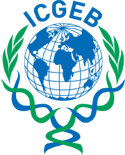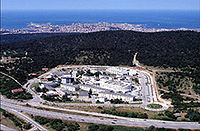
International Centre for Genetic Engineering and Biotechnology
Encyclopedia

United Nations Industrial Development Organization
The United Nations Industrial Development Organization , French/Spanish acronym ONUDI, is a specialized agency in the United Nations system, headquartered in Vienna, Austria...
(UNIDO) as a centre of excellence for research and training in genetic engineering
Genetic engineering
Genetic engineering, also called genetic modification, is the direct human manipulation of an organism's genome using modern DNA technology. It involves the introduction of foreign DNA or synthetic genes into the organism of interest...
and biotechnology
Biotechnology
Biotechnology is a field of applied biology that involves the use of living organisms and bioprocesses in engineering, technology, medicine and other fields requiring bioproducts. Biotechnology also utilizes these products for manufacturing purpose...
for the benefit of developing countries
Developing country
A developing country, also known as a less-developed country, is a nation with a low level of material well-being. Since no single definition of the term developing country is recognized internationally, the levels of development may vary widely within so-called developing countries...
. The Centre, currently under the direction of Francisco E. Baralle, has three Components: Trieste, Italy, New Delhi, India and Cape Town, South Africa and comprises a network of 40 Affiliated Centres (national laboratories located in developing countries).
Created and developed as a special UNIDO programme under the direction of Arturo Falaschi
Arturo Falaschi
Arturo Falaschi was an Italian geneticist. He led a very successful life as a student, teacher and a science administrator. He graduated in Medicine in 1957 from Milan University and undertook two post doctoral studies. Firstly, with J...
, on February 3 1994 the ICGEB acquired the status of Autonomous International Organisation, although it remains within the United Nations system.

It carries out its work of scientific cooperation by the following means:
- research programmes conducted in the Component laboratories;
- a 3-4 year international research doctorate programme in molecular genetics and biotechnology, conducted in collaboration with the Scuola Normale SuperioreScuola Normale Superiore di PisaThe Scuola Normale Superiore di Pisa, also known in Italian as Scuola Normale , is a public higher learning institution in Italy. It was founded in 1810, by Napoleonic decree, as a branch of the École Normale Supérieure of Paris...
of PisaPisaPisa is a city in Tuscany, Central Italy, on the right bank of the mouth of the River Arno on the Tyrrhenian Sea. It is the capital city of the Province of Pisa...
(SNS) or validated by the Open UniversityOpen UniversityThe Open University is a distance learning and research university founded by Royal Charter in the United Kingdom...
, UK or other National Universities;
- short-term post-doctoral study grants (maximum three months);
- long-term post-doctoral study grants (1–2 years) for the training of researchers through participation in the above-mentioned research programmes;
- a series of theoretical and practical courses and conferences on genetic engineering and biotechnology in Trieste, New Delhi, Cape Town and the Affiliated Centres;
- collaborative research programmes undertaken in Member States with ICGEB financial support (grants) ;
- scientific services for member countries, including the supply of sophisticated reagents for scientific research and a telematic network for the analysis of the human genome and other important organisms.

